Foregin
UN: 350,000 People In Congo Need Humanitarian Aid Due To Flooding

Over 350,000 people in the Republic of Congo, where many villages are only accessible by boat, are in need of immediate aid as a result of the worst floods in 60 years, the UN announced on Friday.
The Ubangi River, a tributary of the Congo River, has seen extreme rainfall since October, to the point where the banks have burst, according to the UN Office for the Coordination of Humanitarian Affairs (OCHA).
“The United Nations is responding to a flood disaster, unprecedented in scale for six decades, and with hundreds of thousands of people in need of humanitarian assistance,” an OCHA spokesman said in Geneva.
The republic, also known as Congo-Brazzaville, declared an emergency on December 29.
“Some three weeks later, nine out of the country’s 12 departments remain under water and a total of 1.8 million people are affected,” he said.
“More than 350,000 people urgently need humanitarian assistance, but access is a challenge because of the floods and many villages can only be reached by boat or canoe,” he added.
“Villages, schools and health facilities have been flooded… there’s limited or no access to clean drinking water or sanitation in the worst-affected areas.”
Some 27,000 children are out of school.
UN agencies have developed a plan with the government for a budget of $26 million, targeting shelter, food security, nutrition, health, water, sanitation and hygiene, OCHA said.
International funding will be required to implement the plan, it added.
The floods could also have long-term consequences, with a fall in agricultural output feared as 2,300 hectares (5,700 acres) of cultivated land were under water, OCHA said.
On the other side of the Congo river, the second largest in Africa after the Nile, the Democratic Republic of Congo has also seen exceptional floods.
Residential and tourist areas remain submerged in the 15 million-person capital city of Kinshasa.
In the area, there hasn’t been any significant flooding since 1961.




